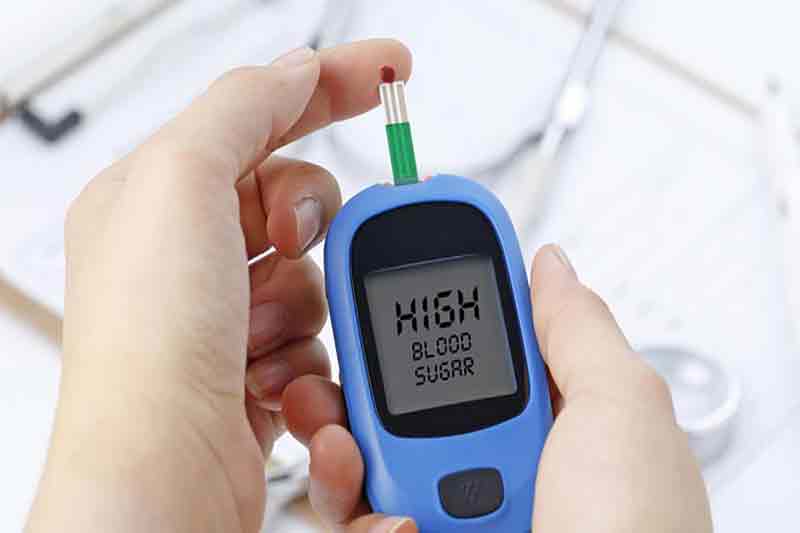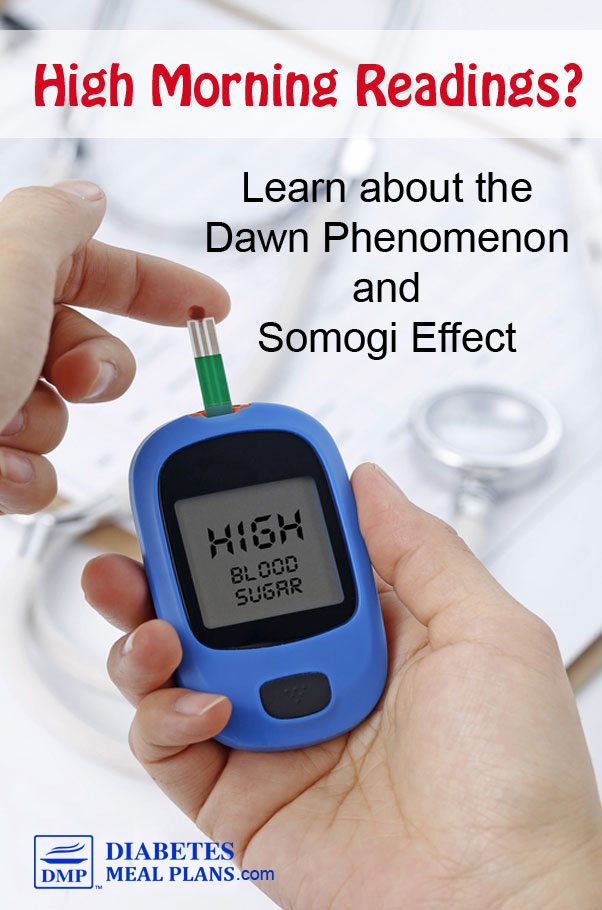Table of Contents[Hide][Show]
Morning blood sugar levels. It’s a topic we always get questions around.
Namely, why on earth are my morning levels so HIGH when I’ve eaten nothing since yesterday. Surely they are meant to be their lowest first thing in the morning?

While it’s easy to assume that this would be the case, there’s more to the picture than you know.
In particular with type 2 diabetes, there are two factors that raise blood sugar overnight. These are known as the Dawn Phenomenon and the Somogyi Effect.
By the time you finish reading this, you should have a much better understanding of why these morning highs occur.
Glucose Happens 24/7
As you may (or may not) be aware of, the body’s cells need fuel to function and that fuel is mainly glucose. Glucose fuels the cells in your organs, in the brain and in the muscles and tissues. And they need fuel 24/7.
While you’re sleeping or if you were to fast, your organs still need to function so the body has other ways it can produce glucose, other than via the direct food you eat.
- Glycogenolysis – some of the excess carbs you eat gets stored in the muscles and liver as glycogen. When these stores are needed, the process of glycogenolysis occurs, breaking the stores down so that more glucose is circulated in the blood to fuel the body.
- Gluconeogenesis – your body is also capable of creating glucose from non-carbohydrate sources such as amino acids in a process called gluconeogenesis.
The body will always try to maintain blood glucose within a certain range in the body. This happens in both diabetics and non diabetics alike. With both kinds of glucose production mentioned above, the result will be more circulating glucose. Although, in diabetics there is often a much higher level of production occurring.
The Dawn Phenomenon
Around 3-4 am (average time 3:41) each morning, there are a collection of counter regulatory hormones that are signaled in your body: glucagon, epinephrine, growth hormone, and cortisol, which result in a rise in blood sugar. This happens to non diabetics, too. It occurs to help wake us up and get us out of bed every morning.
The difference between non diabetics and those that have type 2 diabetes is that in diabetics the malfunction/ deficiency of pancreatic beta cells/ insulin and/or the presence of insulin resistance makes your body unable to counteract the effects of this blood glucose rise – that’s why it’s called the Dawn Phenomenon.
The average rise suggested by studies is an average 20 mg/dL (1.1 mmol/l).
The Dawn Phenomenon effects people of various ages. And if you find that your levels are still high after breakfast, this is what researchers call ‘Extended Dawn Phenomenon,’ which they suggest is a result of the liver still producing glucose internally.
Researchers have discovered that sleep quality affects the severity of the Dawn Phenomenon. So focusing on getting better quality sleep is a great goal to have.
Can you predict the Dawn Phenomenon and control it?
Many healthcare providers fail to address the Dawn Phenomenon as something that needs to be addressed in the management of type 2 diabetes. It’s likely because so far there has been no way to measure if it will occur, or what to do about it.
Being that it does effect around 40% of people and can influence A1C levels by an average 0.4%, researchers did investigate if there was a way to predict the rise.
While there is still research going into this, they did discover that there could be a way.
Here’s how to do the calculation:
- Take your pre-breakfast, pre-lunch and pre-dinner glucose readings.
- Take an average of the pre-lunch and pre-dinner readings.
- Calculate the difference between the pre-breakfast and the average of pre-lunch and pre-dinner readings.
- The difference +15 is the general rise you can expect during the Dawn Phenomenon.
All this is fairly complicated so it’s not likely that you will do it on a regular basis. And as I said, this is very new research so we don’t yet know just how accurate it is. But it’s very interesting.
I believe in time researchers will have a definitive answer to this. And perhaps a solution as well.
For now, the best way to control morning levels is to gain good control of your levels on an every day basis.
Just to recap: the optimal fasting range is between 70-100 mg/dL or 4-5.6 mmol/l. This can differ slightly in some cases where your healthcare practitioner may be more lenient, but those are the optimal goals.
Please pin, tweet or share; then keep on reading.

The Somogyi Effect
The second reason morning levels rise is due to a boomerang effect called the “Somogyi Effect” or “rebound hyperglycemia.”
The Somogyi effect is more common in diabetics who are insulin dependent. It’s when your body’s glucose levels decrease quite significantly overnight (nocturnal hypoglycemia) and as a result your emergency system is activated. This sends messages to your hormones and organs to stimulate more glucose production to help raise your levels.
In a boomerang-like effect, the result can be that blood sugar levels increase quite dramatically. Some people taking insulin choose to get a continuous glucose monitor, which allows for easier detection of nocturnal hypoglycemia.
Hopefully now you understand why those high bounces occur in the morning. Overall, the best strategy to correct high morning levels is to gain very tight control over your blood sugar levels. The more you are in control of your levels on an every day basis, the better your morning levels will likely be as well.
Also be sure to include regular exercise, as it increases insulin sensitivity. Along with getting good quality sleep as it helps calm down those hormones.
Please pin, tweet or share this info to help others. Thanks!


John
I have a glucose of 103. I am 72 year old male & heave been a runner for 42 years. For last 3 months I get a little weak after eating a small breakfast. Usually toast, egg, banana & coffee. Or a breakfast of cereal & coffee.
The problem that I am having is I can only run about 2 miles and a start getting weak. No nausea, or faint, no short of breath. Almost like running on empty. I stop and drink some Gatorade & eat a couple of peanut butter crackers and try to finish my 5 mile run. Sometimes, I can & lately, not able to complete run.
Have had many type of blood test, but only high level is glucose of 103 and urea nitrogen of 25
I have researched this extensively and can’t figure what is causing this.
I am going to try the apple cider vinegar and cheese tonight.
All suggestions are welcomed. I am really frustrated.
Thank you.
Emily - Dietitian (MS, RD)
John, you should call your doctor or physician immediately regarding increased weakness. This can be caused by a multitude of reasons, many not related to blood sugar or diet at all. Your doctor knows your medical history best and will provide specific advice to your situation.
Jeane Copsin
For years I have waked up at around 2:30 am for no apparent reason. Since I am now having problems with my levels being higher in the morning and have gradually become diabetic in spite of all the recommended changes I tried. My blood glucose is always higher in the morning and gradually comes down to around 109 at bedtime. Morning fasting rate is between 130 to 145. Makes me wonder if my waking in the night had something to do with blood glucose levels finally going into diabetic range. Also, until I cut out sugar and lowered my carb intake, I would suffer from night sweats. These have definitely slowed down with my lifestyle changes.
Emily - Dietitian (MS, RD)
As you read in the article, high morning blood sugar is a problem for many; and it’s possible that the changes in hormones is causing you to wake. Check out this article for some tips on lowering blood sugar in the morning- a fan favorite is taking some apple cider vingar and cheese prior to bed. Let us know if any of the suggestions make a difference for you!
joan lewandowski
INTERESTING ABOUT TE CIDER VINEGAR…I ALMOST ALWAYS HAVE SUGAR LEVELS AROUND 160 ..OR AROUND THAT NUMBER WHEN I GET UP LATER IN THE MORNING AROUND SEVEN…EARLIER AROUND THREE AM…COULD BE 150 I HAVE BEEN TOLD A PC OF PROTEIN BEFORE BED WILL HELP THAT…BUT NOW WITH THE MENTION OF THE VINEGAR ADDED…CAN I ASSUME THAT IS A BETTER IDEA…I TAKE METFORMIN BUT DON’T TAKE IT UNLESS I SEE MY NUMBERS ARE A LITTLE HIGH…AS I BELIEVE IT CAN IRRATATE MY STOMACH AND USUALLY AFTER I EAT…AND I AM FAIRLY AWARE THAT I SHOULD CUT MY CARBS AND SUGAR….AND I DO SO….IF MY SUGAR GOES UP AFTER ABOUT TWO HOURS AFTER A MEAL…I DON’T ALWAYS TAKE THE METFORMIN WHICH IS FIVE HUNDRED PER PILL…IT USUALLY GOES DOWN QUITE A LOT BUT NOT QUITE TO THE LEVEL THAT IT SHOULD BE….WHAT DO U ADVISE ABOUT MY MEDS…I WORRY ABOUT THE DAMAGE METFORMIN CAN DO TO MY STOMACH..AND I WILL TRY THE VINEGAR AND ONE SLICE OF CHEESE IDEA…AS I DO GET HUNGRY BEFORE BED TIME…IT’S DIFFICULT NOT TO EAT SOMETHING..I SLEEP WELL…PLEASE RESPOND …THANK YOU…
Emily - Dietitian (MS, RD)
It never hurts to give the cheese and apple cider vinegar idea a try- a lot of our members find it helps tremendously. Certainly if you give that a try and the results aren’t quite what you’re looking for then you could try just a small piece of protein before bed and observe results as well. Everyone responds a little differently to different things, so it’s about finding what works best for YOU.
With regards to your medication, and especially changing your regimen, you need to speak directly with your doctor.
Karan chauhan
My post dinner glucose level is 130 and in the morning my glucose level is 200 ..?
Emily - Dietitian (MS, RD)
Your goal is to keep your post meal readings under 140 mg/dl, and your fasting blood sugar under 126 mg/dl. As you read in this article, high morning sugar can occur for a few different reasons. Check out this article for some ideas about lowering your morning sugar levels!
Mark
This is interesting and is what my nurse told me many years ago. Having said that I’ve been able to follow my blood sugar levels throughout the night with a constant monitor on my arm and it’s a different reaction than expected for me. I don’t take insulin and I managed to reverse my diabetes through weight loss. I used to take metformin but no longer require it. My fasting blood sugar rises as I step out of bed whatever time that may be ie 7am, 8am etc. As I begin moving my sugars rise but only if I’ve eaten perhaps a bit too much the day before (even if it’s still low carb) or perhaps consumed alcohol. In this situation it’s not uncommon to be around 6-7 after being 4-5 throughout the night however if I eat only 3 meals in the day and nothing else I’m below 5.5 or this morning I was 4.8. I follow a low carb way of eating. This suggests for my body it’s about what I eat any maybe many others could be seeing similar.
Jedha
Yes Mark, getting levels well under control and following a low carb diet certainly helps bring morning levels down and control them. Thanks for sharing your experience, as it may benefit others!
Joanne McVay
At midnite my blood sugar was only 150. At 8am it was back up to 254 like its been in the morning. I’m cutting carbs more and exercising more. I am on meds. The article didn’t really answer what to do to help this. Help! Want to fix this!
Jedha
The Dawn phenomenon is still something researchers don’t have a clear answer to fix. Lowering numbers and gaining good control and exercise are two key factors. Quality sleep, minimizing stress are two more. A Tbsp apple cider vinegar mixed with a little water and taken with a slice of cheese before bed has been shown to help and works for some. And herbal remedies also provide assistance. We have info coming on that this week so keep you eyes open for the article.
jim
My first thought as I read through this was how I have changed! Once was a time I would have sucked all this in and tried to make sense from it. Now life is much simpler with little time to get that bogged down. I did wonder immediately, “What would a small snack about 3:00 in the morning do to the process?” Of course that would require waking up long enough to eat something. Doesn’t sound worth setting an alarm for!
Jedha
Definitely not a good idea Jim. You need your sleep equally as well.
Alley
I’m allergic to apples any other ideas that would be beneficial.
Emily - Dietitian (MS, RD)
If you can’t have apple cider vinegar because of the apple allergy, then I would recommend any protein containing snack before bed such as cheese or nuts. This can also help mitigate overnight sugar rises.